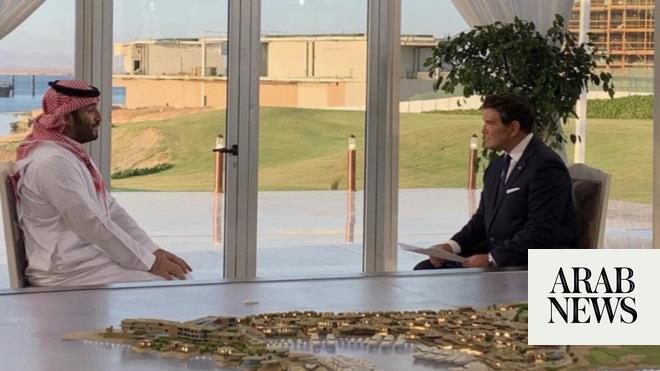
It was a good move by the US to send a high-level delegation to Riyadh just a few days after Saudi Arabia’s Crown Prince Mohammed bin Salman commented on his country’s relationship with the Biden administration. The US envoys met with officials on Monday and sought to clarify the administration’s “recalibration” of its policy with the region. What is needed now is to translate these new understandings into concrete measures to lead the way during the coming years. Time is of the essence, as any delay would create a vacuum that could be exploited by adversaries or lead to misunderstandings or missteps that neither side wants.
In his TV interview last Wednesday, when asked whether there were differences of opinion between Saudi Arabia and the US or if the White House under Joe Biden had turned its back on Riyadh, the crown prince said there was no such thing as 100 percent agreement between any two countries, no matter how close they are, just as in any family, whose members do not always see eye to eye.
He said: “The US is certainly a strategic partner to the Kingdom of Saudi Arabia. They have been our partner for more than 80 years.” But he pointed out that, with every new US administration, there will always be varying margins of differences of opinion. With the Biden administration, there is agreement on more than 90 percent of the issues, leaving less than a 10 percent margin of possible differences that need to be addressed.
Both sides acknowledge the value of their partnership, which has grown tremendously since Saudi Arabia granted American oil companies a vast concession in 1933 to explore for oil. While oil represented the start, their partnership has expanded to include defense, mutual political support, counterterrorism, trade and investment, economic cooperation, and education, among many other areas of common interest.
Current regional and global challenges make the Saudi-US partnership more important than ever. For example, the US plan to reduce its military footprint in the Middle East requires greater defense cooperation in order to avoid leaving a security vacuum. The two countries also see eye-to-eye on most regional issues and their close coordination on addressing them is still needed. As the fight against terrorism is not over, their partnership in counterterrorism must continue. On energy, both countries are major oil producers and need to keep coordinating to maintain stability in the oil markets. In trade, the US needs strong partners, such as Saudi Arabia, the largest economy in the Gulf and the wider Middle East. There are also new priority areas where they have shown leadership and similar interests, including climate change and renewables, which could benefit greatly from closer cooperation.
However, there remain some differences of opinion, which the crown prince said make up less than 10 percent of their relationship. He expressed Saudi Arabia’s readiness to engage on those differences, suggesting: “We try to find solutions and reach an understanding to overcome them, thus neutralizing their risks to both countries while upholding our interests.”
The crown prince pointed out Saudi Arabia’s diversified strategic partnerships, “starting with the Gulf countries, Arab countries, and Middle Eastern countries.” He added: “We’re also working on strengthening our alliances with our partners throughout the world, with the US, the UK, France, Europe, and other countries, as well as seeking to create new partnerships with everyone else, such as Russia, India, China, Latin America, African countries, and others.”
He continued: “We’re strengthening our relations with everyone to serve our interests, their interests, and the international interests. At the end of the day, every country has its choice. If we could work with them to serve everyone’s interests, that would be great. Otherwise, there are a lot of other options out there.”
While recalibrating its regional policy, it is important that Washington reached out to Riyadh to chart the way ahead.
Dr. Abdel Aziz Aluwaisheg
Asked whether the 10 percent disagreement with the US was “just a difference of opinions, or is the US exerting pressure on the Kingdom,” he said: “The Kingdom of Saudi Arabia will not allow any interference in its internal affairs.” He pointed out that the “UN Charter explicitly stipulates that countries have full sovereignty and complete independence,” and that “one of the most important pillars of the charter is respecting the sovereignty of states and prohibiting any interference in their internal affairs. So, if any country interferes in the internal affairs of another country, it means it violated the charter that has maintained the peace of the world and its stability and security after WWII, ensuring its prosperity in the past 50 to 60 years that we currently enjoy.” The crown prince’s repeated references to the UN Charter indicate strong Saudi commitment to the UN-centered rules-based international order in all areas.
While recalibrating its regional policy, it is important that Washington reached out to Riyadh to chart the way ahead and further their common interests. The close personal relationship between King Salman and President Biden will ensure that the Saudi-US partnership will become more robust, that it can overcome recent trials and tribulations, and can meet imminent regional threats and global challenges.
The US delegation to Riyadh correctly stressed the importance of enhancing institution-to-institution cooperation. These institutional partnerships will be strengthened by formal agreements in areas of common interest, providing reliable channels for dialogue, including on the 10 percent margin of differences of opinion between the two capitals. Formal frameworks will also make managing the relationship easier during future transitions between administrations.
Dr. Abdel Aziz Aluwaisheg is the GCC Assistant Secretary-General for Political Affairs & Negotiation, and a columnist for Arab News. The views expressed in this piece are personal and do not necessarily represent GCC views. Twitter: @abuhamad1
Disclaimer: Views expressed by writers in this section are their own and do not necessarily reflect Arab News" point-of-view







